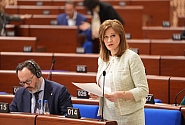
“Foreign interference a threat to democratic security in Europe”, a report prepared by Zanda Kalniņa-Lukaševica, Deputy Speaker of the Saeima and Head of the Latvian delegation to the Parliamentary Assembly of the Council of Europe, was adopted by an overwhelming majority at the Assembly’s spring session in Strasbourg.
“Foreign interference aims to paralyse democratic societies. Across Europe, we see malicious actors exploiting cyberspace, funding radical movements, and creating sophisticated disinformation campaigns. Their aim is the same—to divide, destabilise, and polarise societies,” said Kalniņa-Lukaševica.
The report clearly identifies the main forms of foreign interference: disinformation, cyber attacks, covert political financing, and manipulation of elections, media, and public opinion. The document highlights in particular the extensive interference carried out by Russia since the outbreak of its full-scale war against Ukraine, while pointing out that these tactics are widely used and are also employed by other players.
The author of the report underlined the need to clearly distinguish between legitimate foreign influence, such as public diplomacy, and hidden, manipulative interference in democratic processes: “No country has the right to secretly manipulate another country’s democratic order.”
At the same time, Kalniņa-Lukaševica warned that legal measures to limit foreign influence must be balanced and must not be used as a cover for the repression of civil society, independent media, and defenders of human rights.
“Civil society is not the enemy of democracy, but rather its backbone. It is therefore essential to ensure that freedom of expression and the activities of non-governmental organisations are not curtailed under the pretext of fighting foreign influence,” she stressed.
The report includes concrete recommendations to strengthen democratic security. These include protecting the countries’ electoral infrastructure against cyber attacks, ensuring transparent political financing to prevent foreign funding from being used for political campaigns, and a stronger legal framework to prevent foreign influence.
Fostering societal resilience is also important, in particular through the promotion of media literacy and critical thinking, including in school curricula, and educating citizens about the risks of disinformation.
The author of the report noted that effective prevention of foreign interference is not possible without international cooperation: “We need coordinated information exchange between NATO, the European Union and the Council of Europe. Only by working together will we be able to protect the foundation of democracy.”
Kalniņa-Lukaševica called on European countries to be decisive: “Our best defence is resilience—by strengthening the ability of our citizens to critically assess information, improving cyber security, and ensuring transparency of political funding, we build a democracy that is resilient to external threats.”
The relevance of the report’s theme was evident from the wide-ranging discussions, as more than 60 parliamentarians from many of the organisation’s member states expressed their willingness to speak in the debate.
Photos: https://www.flickr.com/photos/saeima/albums/72177720324941729/with/54436520746
Disclaimer and copyright: www.saeima.lv/en/copyright
Saeima Press Service







